Let’s face it: it’s almost impossible to avoid plastic completely. It’s literally everywhere. Looking around the room I’m currently in, I see that my mouse and keyboard are made of plastic, as are my headphones, and landline telephone. At this moment in time, it’s just not feasible to completely rid your life of plastic.
However, there are simple ways we can all reduce the amount of plastic we use and dispose of. If everyone in the world followed these suggestions, it would mean millions of tonnes less plastic polluting our landscapes and seas.
Do you know any other ways to reduce plastic waste? Write your suggestions in the comments beneath the article.
- 1. Always bring your own shopping bag to the supermarket
- 2. Don’t buy bottled water!
- 3. Bring your own cup to the coffee shop
- 4. Ditch the plastic straws
- 5. Don’t use disposable plastic razors
- 6. Cut down on plastic food packaging
- 7. Get your milk in glass bottles
- 8. Avoid plastic cutlery
- 9. Whenever possible, wear clothes made from natural, and not synthetic, material
- 10. Say no to the little plastic pizza table!
- Summary
1. Always bring your own shopping bag to the supermarket

I know, I know, this one seems obvious; we’ve been doing this for years. But despite most countries now charging for taking a plastic bag, a frightening 3 billion plastic carrier bags are used in the UK each year.
Many of us are guilty of nipping into a supermarket to get a few things and forgetting to take with us a plastic bag. What are you going to do, carry your 30 items home? No, so you get a plastic bag and promise to be better next time. It’s easily done.
Here are some tips to avoid this happening:
- Strategically stash some bags where you might need them. In your car, at work, in your handbag, in your laptop bag. That way, even if you forget to take one with you, you’ll always have one to hand when you need it.
- Buy a foldable shopping bag and keep it in your purse, wallet or handbag. When folded they don’t take up much space at all, and will be handy in an emergency.
- If you do end up with excess plastic bags in your house, you can recycle them at most large supermarkets (and if you can’t, ask them why not!). Just don’t put them in the normal recycling bin.
2. Don’t buy bottled water!
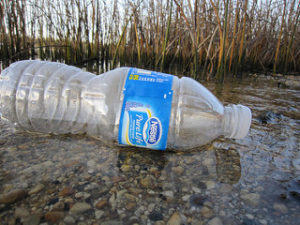
38.5m plastic bottles are still used every day in the UK, with most of them ending up in landfill.
Invest in a glass or stainless steel alternative instead, and get into the habit of taking it with you everywhere you go.
Apart from anything else, buying bottled water is just unnecessary. There is no evidence that bottled water is better for you than tap water, and tap water is free. Don’t be fooled by the million-dollar marketing budget of bottled water companies; water that trickles down from a volcano is not superior to the water that comes from your tap.
3. Bring your own cup to the coffee shop
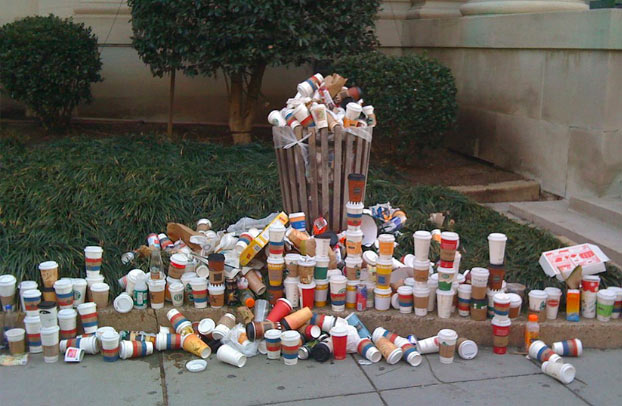
In the UK we use 7 million disposable coffee cups every day – that’s 2.5 billion cups every year.
Planning a trip to the coffee shop? Take a reusable coffee cup! They come in all kinds of funky designs and sizes, and you can sleep easy knowing you’re doing your bit to stop the scourge of plastic coffee containers. A large number of shops will offer discounts for bringing your own cup. If your local coffee shop doesn’t offer such a discount, why not fire off an email to them to suggest it?
4. Ditch the plastic straws
Suffice to say, plastic straws are a blight on our environment, and a danger to animals.
Here’s how you can help:
- Make a conscious effort to say ‘no’ to plastic straws whenever you are offered them. Whether that’s at a bar, restaurant, or even a child’s birthday party. The more we phase them out of our lives, the fewer of them will be sold.
- Straws are fun, particularly for children. If you don’t want to give up straws altogether, we suggest you look into straws made from a more environmentally friendly alternative, such as bamboo, paper, glass or stainless steel.
- Restaurants and bars are beginning to sit up and take notice, but most still offer plastic straws. If you know of such an establishment, send them an email or tweet and suggest they make the switch.
5. Don’t use disposable plastic razors
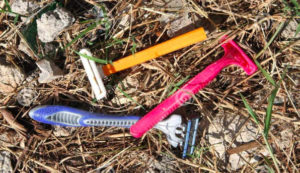
The United States Environmental Protection Agency, estimates around 2 billion disposable razors are thrown away each year in the US. Laid end to end they would stretch halfway to the moon.
We can all help reduce this unnecessary waste by being a bit more careful with our shaving habits. And besides the environmental benefits, you will save money. Disposable razors are expensive!
For Men:
Consider investing in a straight razor (otherwise known as a cut-throat razor). Shaving with a straight razor is a little more time consuming than using a disposable razor, but it gives you a closer shave, and if you look after your razor, it will last for years.
Safety razors are another option worth looking into. The razor itself is built to last, but you will have to replace the razors once they begin to go blunt.
For women:
Lots of women are making the switch from disposable plastic razors to using a safety razor. As a man, I’m not in a position to comment on the ins-and-outs of this procedure, so if you’d like to learn more, why not have a read of this article. By all accounts, using a safety razor is just as effective as using a disposable. It will also save you money in the long term, and won’t contribute to the millions of plastic razors currently lying in a landfill and cluttering our beaches.
6. Cut down on plastic food packaging
We’ve all seen examples of supermarkets and food manufacturers using unnecessary plastic packaging for their produce. Can anyone tell me why bananas need to come in a plastic bag!?
Here are some ways you can cut down on the amount of plastic packaging you take home from the supermarket:
- The first one is obvious, but when given the choice between buying fruits and vegetables wrapped in plastic, and those not wrapped in plastic, opt for the loose variety. Just give them a wash when you get home.
- The same goes for every product in the supermarket – choose the pasta in a box rather than a plastic bag, opt for the cardboard box of washing powder instead of the plastic bottle. Be mindful as you shop and eliminate as much plastic as possible from your basket.
- Some shops offer ‘refill stations’, where you can stock up on basic ingredients like rice, nuts and cereal. Bring your own container, and you’ll go home with no more plastic than when you arrived. If you’re in the UK, check thezerowaster.com for a list of packaging-free shops and zero waste projects.
While these measures will go some way to reducing the amount of plastic packaging in circulation, what we really need is to change the way supermarkets and food manufacturers package their food. Most of the time it’s just all so unnecessary.
Email your local supermarket, your MP, or food manufacturers, and ask them if all that packaging is really necessary. If we make enough noise, they’ll begin to listen.
7. Get your milk in glass bottles
Milk floats used to be a common sight in the UK – cheery milkmen delivering glass milk bottles door-to-door. Then supermarkets figured out they could offer milk cheaper to the consumer if they used plastic bottles.
As it happens, demand for a return to glass-bottled milk is rising, fuelled by the fact people are fed up having to dispose of multiple plastic bottles per week. Yes, plastic milk bottles are recyclable, but sadly not everyone takes the time to do so, and many bottles end up in landfill.
Or stop drinking milk all together.
8. Avoid plastic cutlery
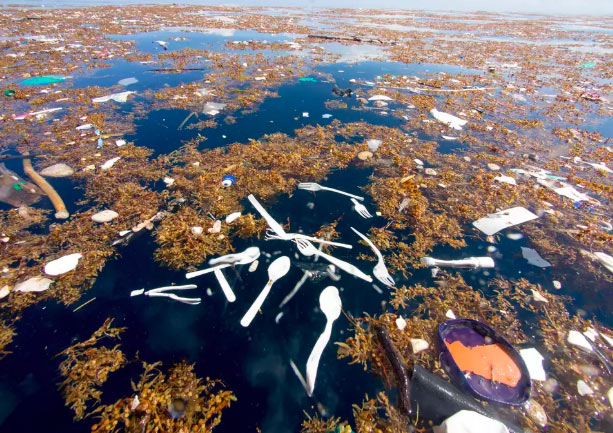
According to this article by the Telegraph, plastic items from takeaway food and drink items now make up 10% of all litter. The same article goes on to say “138 pieces of food and drink-related waste are found on every 100 metres of UK beaches.”
If you’re buying food from a takeaway, take a moment and think “do I really need to take the plastic cutlery, or can I wait until I get home?” Better yet, why not keep a wooden knife and fork in your handbag or in your car, for such an eventuality?
Oh, and try to avoid buying tubs of ice cream that come with little plastic spoons. Millions of them are found on beaches every year. Go for the cone instead (or bring your own spoon).
9. Whenever possible, wear clothes made from natural, and not synthetic, material
Everybody knows that plastic is finding its way into our oceans, but what is less commonly known is that the source of some of this plastic pollution is from the clothes we wear.
About 60% of the clothes we wear contain synthetic materials – usually polyester, nylon or acrylic. It’s strong, breathable, and cheap.
Every time we wash these clothes, it is estimated that up to a hundred thousand tiny plastic particles (microplastics) are released from the clothes and can eventually wind up in the ocean.
Once in the ocean, they do not just decompose, but rather break into smaller and smaller particles. They are ingested by fish, making their way up the food chain, where eventually they can be ingested by humans.
There is no easy solution to this one. Synthetic fibres are often cheaper, and a lot of people just can’t afford to wear only natural fibre clothes.
If you’d like to do your bit to reduce the number of microplastics being released into the water system, experts suggest buying fewer clothes and washing them only when necessary.
10. Say no to the little plastic pizza table!
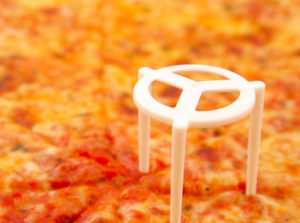
Ok, so this one might require a bit of explanation, but it’s probably the easiest one on this list to follow.
If you’ve ever ordered a takeaway pizza, you’ve probably seen the little plastic ‘table’ looking thing they put in the centre of the pizza.
Its purpose is to stop the cardboard pizza box from touching the food inside. But would that really be the end of the earth?
If you’re phoning in your order, tell them not to include it. If you’re ordering online, you can usually leave an order note where you can say ‘no!’ to their silly little table.
Summary
I hope you manage to take something useful from this article. You might find some of the items in this list easier to follow than others, and that’s fine. People have busy lives, and it’s hard to completely avoid plastic.
But if we all made a conscious effort to cut down on the amount of plastic we put out into the world, we could make a real difference.
Do you know of any other ways to reduce the amount of plastic in your life? We’d love to hear from you. Share your thoughts in the comments below.
